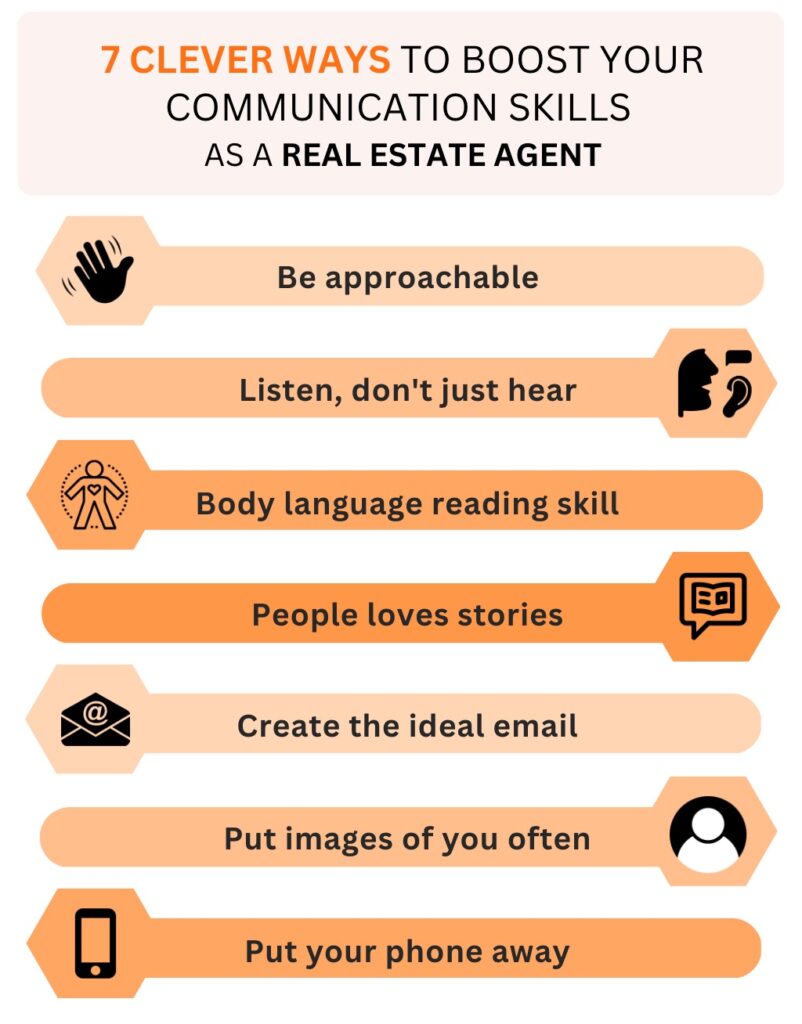Real estate is a people business and that means communicating well is vital to your professional success. Like a smile, it can make all the difference.
Improving your communication skills will boost your real estate expertise across the board. From signing up a client to buying, selling, negotiating and delivering both good and bad news, good communication is your key to success.
1. Be accessible
One of the most important communication skills is also one of the simplest – accessibility. Respond to every client query by the end of the day, or by Monday if it’s the weekend. This shows your potential and current clients that you value them.
Don’t answer calls when you’re with clients. Put your phone on silent, or vibrate, and leave it in your pocket. The clients you’re with deserve 100% of your attention. As long as you return the calls you missed by the end of the day, you’re a hero.
2. Make sure you’re listening rather than hearing
The key to forging a good connection with your clients is also straightforward. Pay attention to what your clients are saying and how they’re saying it. Take time to absorb the meaning.
There’s a difference between listening and hearing. Hearing is the passive intake of external sound, but listening is using your brain to understand the meaning of the words you’re hearing.
As one specialist who works in this area put it: ‘The phrase in one ear and out the other is a good description of hearing as opposed to listening.’
Being an effective listener requires an open mind and an open heart. An open mind lets you understand fully what your client is saying, while an open heart lets you empathise with their fears, hopes and goals.
3. Master the skill of reading body language
Interpersonal communication can be both formal and informal. And, by far, the most informal communication comes through those unspoken cues that are broadcast by a person’s body language.
Leadership strategist Carol Kinsey Gorman points out that the best salespeople are expert readers of body language. Eye contact, posture, facial expression, hand gestures and leg movements can all be read like a road map and lead to closing a deal.
Mastering this skill will also help you to read the room and figure out whether your sales pitch is gaining traction or not.
4. People love stories
Let’s say you went to purchase a painting you found online. You liked the painting, but were indecisive when the seller said “You know the painter won the Wynne Prize in 1960, and she painted this when she lived in Paris.” You’re suddenly interested because there’s a story attached to the painting and, of course, you want own it now.
People love stories. Research your properties and if there are interesting events or facts that won’t offend anybody tell them as stories. A house might have once been a warehouse or a shop. A former resident may have been a well-known historical figure. The wallpaper might have been hand-painted in France, or the garden may have been the setting for a wedding.
A couple of tips: don’t announce that you’re going to tell a story. Just tell it. And second, don’t apologise before you tell the story. It might also pay to check with the vendor in case they’d prefer you not mention something.
5. Write the perfect email
As you tap away at your keyboard, always strive for the sweet spot of moderation. You want your emails to be friendly, but not overly familiar. They should be long enough to convey the information needed, but not so long that your recipient stops reading half-way through.
Above all, always remember one hard-and-fast rule – never push the ‘send’ button in anger. Once an email is sent, there’s no telling where in the world it’ll end up.
So, if you’re irritated or annoyed, put the issue away overnight and come back to it the next morning with fresh eyes. That way you can make sure your cooler head will prevail.
6. A picture is worth a thousand words
You are your brand, so don’t hesitate to flaunt your portrait wherever you can.
A photo of you well-dressed and smiling conveys an unspoken message of friendliness, confidence and competence. And that’s the sort of image that will help you get a foot in the door with clients who are searching for a real estate agent they can trust.
7. When to put your phone away
For any real estate agent, a mobile phone is an indispensable tool of the trade.
But while your mobile lets you stay in contact with your clients and respond to enquiries, it’s also important to know when to turn it off.
Imagine you’re in the middle of an in-person presentation to a client when your mobile vibrates. Should you answer?
Definitely not! Not even if you’re chatting at the end of the presentation or seeing the client off.
Interrupting your client interaction to take a phone call will make your clients feel devalued. And a devalued client soon becomes an ex-client who’ll surely tell a tale that may do lasting damage to your professional reputation.
Leave your mobile in your pocket whenever you’re meeting with clients or homebuyers in person. The call will go to voicemail and you can return it once your meeting ends.
Don’t be disheartened if you blush scarlet when talking to clients or standing in front of a group of people.
Nervousness is normal when you start out. Just remember to plan, practise and do deep breathing exercises before you commence. Remember, the more you push yourself to do it, the better you’ll be at it.
If you’re interested in a career in real estate, Entry Education is your golden opportunity to join the ranks of real estate leaders across Australia.
Our online training courses allow you to study in your own home at your own pace with your personal online tutor. Contact us today. We’d love to hear from you!
















